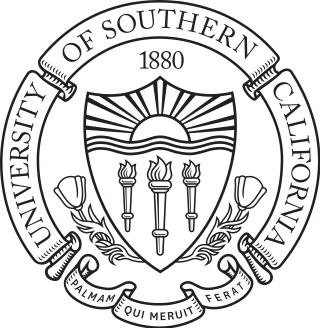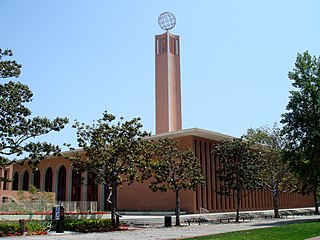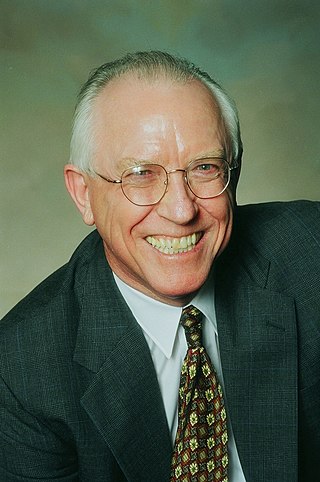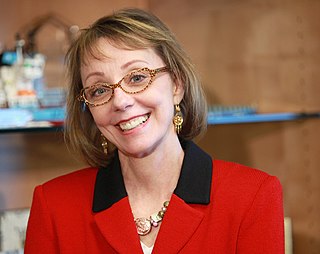
The University of Southern California is a private research university in Los Angeles, California, United States. Founded in 1880 by Robert M. Widney, it is the oldest private research university in California.

The University of Southern California School of International Relations (SIR) is the third-oldest school of international relations in the world. A subdivision within the USC Dana and David Dornsife College of Letters, Arts, and Sciences, the school is known for teaching, and hiring faculty who concentrate in a variety of worldviews.

Ronald Benjamin Linsky was an American marine biologist who served as Executive Director of the National Water Research Institute (NWRI) for 15 years, where he was responsible for overseeing an institute dedicated to supporting cooperative research to create new sources of water and to protect freshwater and marine environments. Under his leadership, NWRI grew into the third largest water research institute in the United States.

The Virginia Institute of Marine Science (VIMS) is one of the largest marine research and education centers in the United States. Founded in 1940, VIMS is unique among marine science institutions in its legal mandate to provide research, education, and advisory services to government, citizens, and industry. Funding for VIMS comes from the Commonwealth of Virginia, grants and contracts from federal and state agencies, and private giving. The School of Marine Science (SMS) at VIMS is the graduate school in marine science for the College of William & Mary. VIMS offers M.S., Ph.D., and professional M.A. degrees in marine science. The school has 52 faculty members, an enrollment of 80-100 students, and includes 4 academic departments. VIMS' main campus is located in Gloucester Point, Virginia.
The academics of the University of Southern California center on The College of Letters, Arts, and Sciences, the Graduate School, and its 17 professional schools.

Santa Catalina Island is a rocky island off the coast of Southern California in the Gulf of Santa Catalina. The island name is often shortened to Catalina Island or just Catalina. The island is 22 mi (35 km) long and 8 mi (13 km) across at its greatest width. The island is located about 29 mi (47 km) south-southwest of Long Beach, California. The highest point on the island is Mount Orizaba. Geologically, Santa Catalina is part of the Channel Islands of California archipelago and is the easternmost of the Channel Islands. Politically, Catalina Island is part of Los Angeles County in District 4. Most of the land on the island is unincorporated.
Otto Schnepp was an Austrian-American scientist.
The Southern California Marine Institute (SCMI) is a multi-campus research facility and non-profit oceanographic institution headquartered in Terminal Island, California.
David H. Dornsife is an American businessman and philanthropist from California. He serves as the Chairman of the Herrick Corporation, a steel corporation. With his wife, Dana Dornsife, he donated US$200 million to his alma mater, the University of Southern California in Los Angeles, California, where the Dornsife College of Letters, Arts and Sciences was named in their honor. The Dornsifes also support charitable causes in Africa.
Hanna Reisler is an Israeli-American Professor of Chemistry at the University of Southern California. She is interested in the reaction dynamics of molecules and free radicals, as well as the photodissociation in the gas phase. Reisler established the University of Southern California Women In Science and Engineering (WISE) program.
Duncan Ryūken Williams is a scholar, writer, and Soto Zen Buddhist priest who is currently professor of religion and East Asian languages and cultures at the University of Southern California. He also serves as the director of the USC Shinso Ito Center for Japanese Religions and Culture. His research focuses on Zen Buddhism, Buddhism in America, and the mixed-race Japanese (hapa) experience.
The Center for the Political Future (CPF) is a non-partisan center housed in the University of Southern California's Dornsife College of Liberal Arts and Sciences. The center was established in order to combat uncivil political discourse and promote bipartisan, fact-based dialogue on national issues. The Center for the Political Future hosts conferences, offers a Fellows program, hosts an ongoing dialogue series called Political Conversations, and provides a neutral ground for political discourse in "off-the-record policy workshops" with top experts from relevant disciplines, among other programs.

Dana Dornsife is an American entrepreneur, patient-advocate and philanthropist in the areas of health care, education, the environment and social justice. She is the Founder and Chief Mission and Strategy Officer of Lazarex Cancer Foundation, a nationwide non-profit organization that helps advanced-stage cancer patients find and access treatment through Food and Drug Administration clinical trials. Dornsife and her husband, American businessman David H. Dornsife, are philanthropists who have donated hundreds of millions of dollars to charitable causes and were named among the nation’s Top 50 most generous donors in 2016 by The Chronicle of Philanthropy. The couple made the list of America's Top 50 Donors of 2020 as well according to Philanthropy 50, an annual ranking compiled by The Chronicle of Philanthropy. They ranked #27 for giving $59 million.

Roberta Marinelli is an oceanographer who started her position as Dean of the College of Earth, Ocean and Atmospheric Sciences at Oregon State University in 2016.
Steven J. Ross is an American historian of film and culture. He is the Dean's Professor of History at the University of Southern California and the Myron and Marian Casden Director of the Casden Institute for the Study of the Jewish Role in American Life.
Christian Robert Grose is an American political scientist. He is a professor of political science and public policy at the University of Southern California, academic director of the USC Schwarzenegger Institute for State and Global Policy, and served as director of the Political Science and International Relations PhD Program from 2015 to 2018. He studies behavioral elite decision making in politics, racial and ethnic politics, public policy, voting rights, political representation, and legislative politics.
Lihini Aluwihare is a Sri Lankan Marine chemist, and oceanographer. She teaches at Scripps Institution of Oceanography.

Geraldine Knatz is a maritime expert, academic, and author. She was the first female port director of the Port of Los Angeles, appointed in January 2006 by Los Angeles Mayor Antonio Villaraigosa. As Los Angeles port director she formulated and implemented the Clean Truck Program, and the San Pedro Bay Ports Clean Air Action Plan. She is a Professor of Practice at the University of Southern California, with a joint appointment to the USC Viterbi School of Engineering and the USC Price School of Public Policy.
Karl E. Huggins is an American decompression researcher and author of a set of air decompression tables for reduced risk and multi-level repetitive diving based on the US Navy tables modified to avoid Doppler ultrasound detectable vascular bubble production. He developed the algorithm used by the first commercially successful microprocessor-based decompression computer, the Orca Edge, based on the US Navy decompression algorithm derived by Robert D. Workman, but taking all six tissue compartments into account when calculating residual nitrogen for multi-level and repetitive dives.








